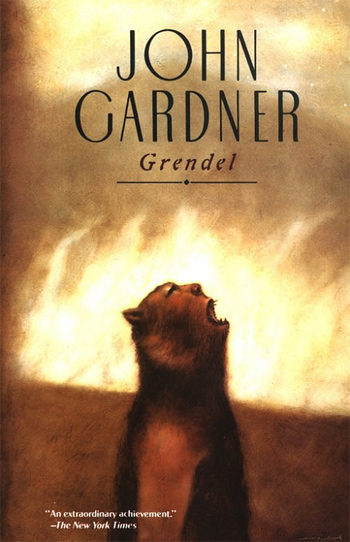John Gardner
Completed 3/8/2014, Reviewed 3/12/2014
5 stars
“Grendel” is a retelling Beowulf myth from the point of view
of the monster from the epic poem. Not
simply a dark fantasy, it is a character study of a monster, an existential
exploration of the meaning of life for an evil being. Sometimes tragic, sometimes hysterical, sometimes
over-the-top philosophical, it is a wonderful read that takes you into the soul of
a monster. And here’s a bonus: you don’t have to read Beowulf first to
understand get. A word of caution, however,
as there is a spoiler in my review. I discuss
the ending, but I’m going to assume that reader knows something about the story and already knows, or at least, can guess the ending.
Grendel tells his story in the first person. You get to see the world through his eyes. First you experience his relationship with
his mother. She’s also a monster,
perhaps with some human in her, but so old she can barely communicate. He often has to lift her to move her
around. Her attachment to him is
powerful. She cries and moans, and
expresses her fear for Grendel’s well-being with arm-waving and grunting. When he is distraught, she nearly suffocates him
when she pulls him to her breast, trying to comfort him as if still trying to
nurse him.
You also experience Grendel through his relationship with
nature: his futile attempts to scare away goats, the repetitive onslaught of a
bull attacking Grendel while he is stuck between two trees. These seem to help Grendel understand the
futility of life and how over and over again, life will pummel you unless you
can figure out how to avoid the onslaught and just let the horns graze
you. Eventually, you will be saved, but
even an overprotective monster mother will not always be around to help you out
of life’s scrapes.
Lastly, there’s Grendel’s relationship with humans. At first it’s not a hostile
relationship. Grendel often hides near
the meadhall, listening to the harpist play and sing ballads. It mesmerizes Grendel. He longs for the companionship of others and
the enchantment that music puts over the harsh reality of life. With music, everything seems better. Through music, you can believe anything. Eventually, of course, Grendel is misconstrued as a killer, making his relationship with humans adversarial.
Another encounter that should be mentioned is with the dragon. The dragon is not just
another monster. The dragon is a mentor,
if a cynical one, expounding on his philosophy of life and the nature of
monsters. In the most
comical scene in the book, Grendel, like the reader, is utterly confounded by the dragon’s ranting. What he takes with him
is that evil gives meaning to goodness.
Without the monsters, there would be no heros. So Grendel has a purpose in life, to be the
monster he was born to be.
All the prose that gets you through Grendel’s exploration of
himself, his nature, and the world is simply beautiful. The book is short and it is told from only
one perspective, Grendel’s. And with a
literary novel, that’s a great thing, because it makes the reading of the prose
so easy, and it gives you the time to really focus on Gardner’s elegant choice
of words.
I only had one problem with the book, the end. It seems like Gardner had to find a way to
make the story end the way it’s supposed to.
And that’s fine, but it happened quickly, almost clumsily, like it was
written when Gardner was in a different state of mind and was just trying to
finish the book. But even as I reflect
on this, I have this itch that tells me I’m wrong. Maybe the point of the end is to signify how
abrupt and shockingly reality can destroy our life-lie, the belief system we
create to give meaning to our lives, the thing that makes us feel
invincible. One minute, we revel in the
illusion of invulnerability which has gotten us this far in life. Then reality finds our one weakness
and brings us to our knees in an unbelieving stupor. Wow, I think I just had an epiphany.
This book is an incredible read. It’s a gorgeously written, extremely intimate
piece of literature. It’s a little like
Mary Shelley’s Frankenstein. But instead
of pitying Grendel, you come to identify with him and his angst,
and your heart breaks in the end. Five
stars.

guess I will put this one on my list as well.
ReplyDeleteNicely done!
ReplyDeleteI loved it and used it when teaching Beowulf.
ReplyDelete